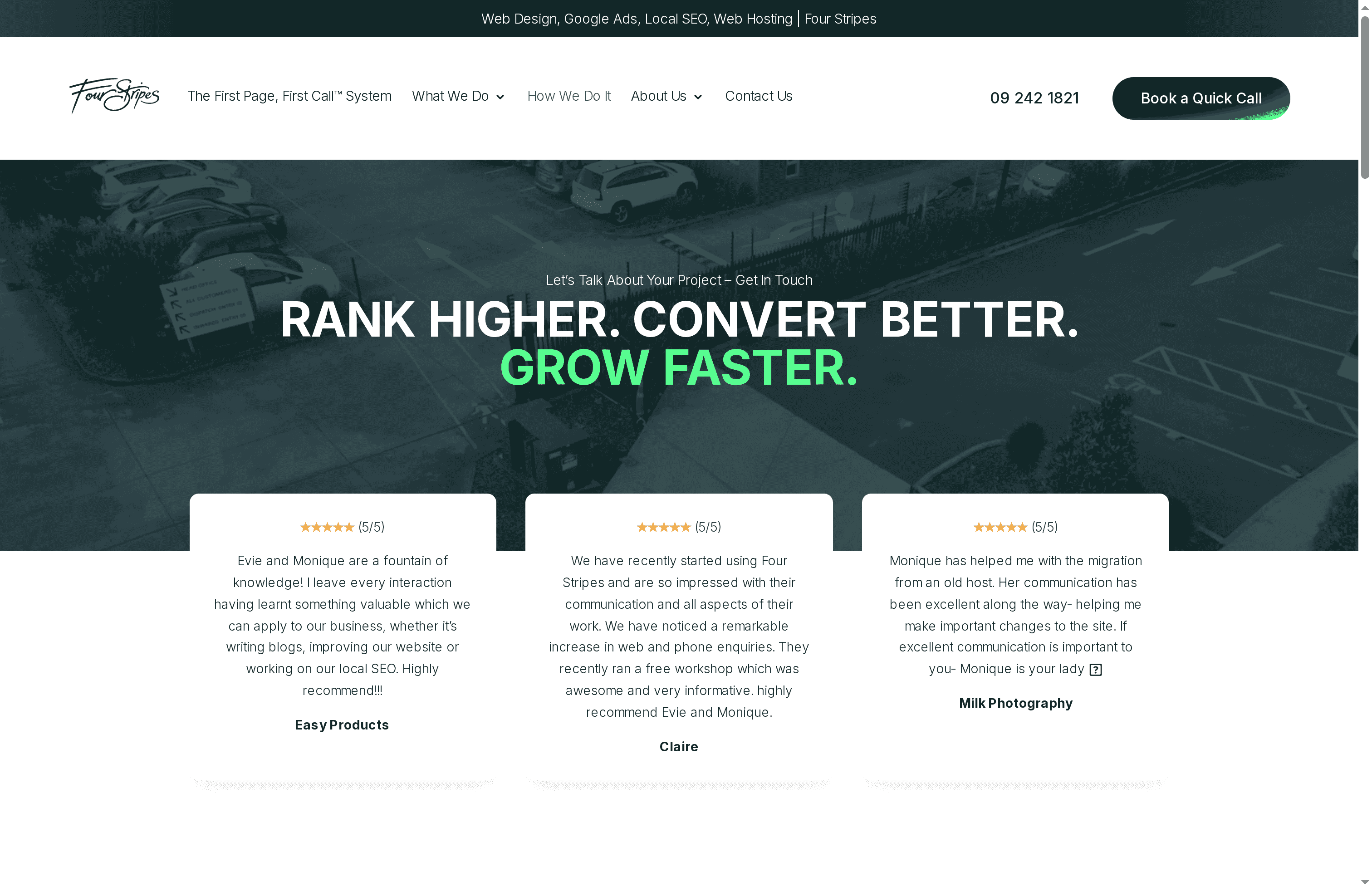Over 70 percent of local customers rely on Google to discover businesses right in their neighbourhood. In today’s marketplace, standing out online means more than just having a website—it starts with dominating search results when locals are looking for your services. If you want to attract more customers, boost credibility, and become the go-to choice in your area, these proven local SEO strategies will put your business ahead of the competition.
Table of Contents
- 1. Optimize Your Google Business Profile for 2025
- 2. Target Local Keywords Relevant to Your Service
- 3. Earn Quality Local Listings and Citations
- 4. Gather and Respond to Customer Reviews
- 5. Build Location-Specific Service Pages
- 6. Leverage Schema to Highlight Local Relevance
- 7. Measure Performance and Adjust Strategies Regularly
Quick Summary
| Takeaway | Explanation |
|---|---|
| 1. Optimize Your Google Business Profile | Regularly update your GBP to enhance visibility in local searches. Accurate information and engaging content attract more customers. |
| 2. Focus on Local Keyword Targeting | Use specific local keywords to improve search visibility. Phrases should reflect community needs and service locations to attract nearby clients. |
| 3. Build Quality Local Listings | Ensure consistent business details across various directories. High-quality citations enhance credibility and local search rankings. |
| 4. Gather and Respond to Customer Reviews | Actively managing reviews boosts your online reputation. Responding promptly demonstrates commitment to customer satisfaction and service quality. |
| 5. Create Location-Specific Service Pages | Dedicated service pages for different neighborhoods improve search results. Tailor content to local issues to connect with potential customers more effectively. |
1. Optimize Your Google Business Profile for 2025
TL;DR: Your Google Business Profile is your digital storefront. Update it consistently and strategically to dominate local search results.
Your Google Business Profile (GBP) remains the single most powerful local search tool for small New Zealand businesses in 2025. Think of it as your online calling card that tells potential customers exactly who you are and why they should choose you.
Successful GBP optimization goes beyond basic information. According to research from local SEO insights, businesses that actively manage their profile see up to 70% more customer interactions. This means regularly refreshing your content and engaging with customer experiences.
Key Optimization Strategies:
- Verify and update your business name, address, and phone number
- Select the most precise business categories
- Upload high resolution photos showcasing your actual work
- Write a compelling business description
- Respond to all customer reviews within 48 hours
Photos play a critical role in profile performance. Customer research shows profiles with professional images receive 42% more click throughs compared to text-only listings. Include images of your team, completed projects, and your physical workspace to build immediate trust.
Customer reviews are your secret weapon. Encourage satisfied clients to share their experiences directly on your GBP. Authentic, detailed reviews signal to Google that your business is credible and actively serving your local community.
Remember: Your Google Business Profile is not a set-it-and-forget-it asset. Treat it like a living, breathing representation of your business that requires consistent attention and strategic updates.
2. Target Local Keywords Relevant to Your Service
TL;DR: Local keywords are your secret weapon for attracting nearby customers and dominating search results in your specific service area.
Local keyword targeting transforms how potential customers find your business online. It goes beyond generic search terms and zeroes in on hyperlocal phrases that signal exactly where and what you offer.
Research shows businesses using precise location-specific keywords can increase their local search visibility by up to 60%. The magic happens when you understand how potential clients actually search for services in their neighbourhood.
Effective Local Keyword Strategies:
- Combine service type with specific suburb names
- Include neighbourhood specific descriptors
- Use natural language people actually speak
- Target long tail local keyword variations
- Integrate keywords naturally into website content
For instance instead of just saying “plumber”, use “emergency plumber in Mount Wellington” or “residential plumbing services Christchurch central”. These specific phrases help Google understand your exact service area and match you with nearby customers searching for precisely what you offer.
Location matters more than ever. By creating website content that speaks directly to your local market, you signal to search engines that you are the go-to local expert. Think about the unique problems your local community faces and address them directly in your keyword strategy.
Pro tip: Use tools like Google Keyword Planner to discover the exact phrases your local customers are typing into search. Look for keywords with moderate search volume and lower competition to give yourself the best chance of ranking quickly.
Remember local keyword optimization is an ongoing process. Regularly review and update your keywords to stay ahead of changing search trends and local market dynamics.
3. Earn Quality Local Listings and Citations
TL;DR: Local citations act like digital references for your business, building credibility and improving search engine trust.
Local listings and citations are the unsung heroes of local SEO. Think of them as digital validation stamps that tell search engines your business is legitimate and relevant in your local market.
Research shows businesses with consistent and high quality citations can improve their local search rankings by up to 50%. The key is not just getting listed but ensuring your business information remains accurate across multiple platforms.
Strategic Citation Building Steps:
- Target reputable local and national business directories
- Maintain exact consistency in business name, address, phone number
- Verify listings on industry specific platforms
- Monitor and update citations regularly
- Seek quality over quantity in listing placements
Start with core directories like Yellow Pages, Google Business Profile, and local chamber of commerce websites. Each verified listing increases your digital footprint and signals to search engines that you are an established local business.
Consistency is absolutely critical. A single variation in your business name or address can confuse search algorithms and potentially harm your local search performance. For instance always use “ABC Plumbing” instead of alternating between “ABC Plumbing” “ABC Plumbing Services” or “ABC Plumbing Ltd”.
Beyond standard directories look for industry specific and location specific platforms where you can create targeted website content that resonates with your local audience. Local trade associations professional networks and community websites can be goldmines for quality citations.
Pro tip: Create a standardized citation profile document with your exact business details. Use this as a reference when submitting listings to ensure 100% consistency across all platforms.
Remember citation building is an ongoing process. Regularly audit your existing listings and seek out new high quality citation opportunities to maintain and improve your local search visibility.
4. Gather and Respond to Customer Reviews
TL;DR: Customer reviews are your digital reputation currency. Actively managing reviews can dramatically boost local search visibility and customer trust.
Customer reviews are far more than just online feedback. They represent a powerful signal to search engines about your business credibility and customer satisfaction levels.
Research indicates businesses that actively engage with reviews can improve their local search rankings by up to 45%. This means every review represents an opportunity to showcase your commitment to customer service and potentially attract new clients.
Review Management Best Practices:
- Encourage reviews from satisfied customers
- Respond to every review professionally
- Address negative feedback constructively
- Set up a systematic review collection process
- Thank customers for positive feedback
The psychology behind reviews is fascinating. Potential customers read reviews as social proof demonstrating your business reliability. A single detailed positive review can be more compelling than pages of generic marketing copy.
When responding to reviews focus on specifics. Instead of generic “thank you” messages reference the exact service or interaction. For negative reviews show genuine concern and offer to resolve the specific issue offline.
Timing matters. Aim to respond to reviews within 24 to 48 hours. This quick turnaround signals that you value customer feedback and are actively engaged with your community.
For more comprehensive strategies on building an exceptional online presence, check out our website development guide that can help you create a review friendly digital platform.
Remember reviews are an ongoing conversation. Treat each review as an opportunity to demonstrate your business values professionalism and commitment to customer satisfaction.
5. Build Location-Specific Service Pages
TL;DR: Location-specific service pages are your secret weapon for dominating local search results and connecting directly with neighbourhood customers.
Local service pages transform how potential clients find and perceive your business. By creating highly targeted content for specific areas you signal to search engines that you are the go-to expert in those neighbourhoods.
Research indicates businesses using location-specific pages can improve local search visibility by up to 65%. This strategy goes beyond generic service descriptions and speaks directly to the unique needs of each community you serve.
Effective Location Page Creation Strategies:
- Target specific suburbs and neighbourhoods
- Include local landmarks and area specific details
- Showcase neighbourhood specific services
- Use natural local language and references
- Highlight local customer success stories
Imagine you are a plumber serving multiple Auckland suburbs. Instead of a generic services page you could create dedicated pages like “Plumbing Services in Mount Eden” or “Blocked Drains in Ponsonby” that speak directly to those community needs.
Content on these pages should go beyond basic service descriptions. Include local references community insights and specific problems unique to that area. For a roofing company this might mean discussing how Mount Wellington homes have particular architectural challenges that require specialized roofing solutions.
To make these pages truly effective you need more than just keyword stuffing. Provide genuine value through comprehensive website content that demonstrates deep understanding of local community needs.
Pro tip: Use customer testimonials from specific neighbourhoods to add authenticity. A review from a Mount Eden resident will resonate more strongly with other potential clients in that area.
Remember location specific pages are living documents. Regularly update them with new local insights customer stories and area specific service offerings to maintain their relevance and search engine appeal.
6. Leverage Schema to Highlight Local Relevance
TL;DR: Schema markup is your secret weapon for helping search engines understand your business exactly as you want them to see it.
Schema markup functions like a digital translator for search engines. It transforms your website content into a language that algorithms can comprehend with crystal clear precision.
Research demonstrates that implementing structured data can improve search visibility by up to 40%. This means your business becomes significantly more discoverable without changing your actual website content.
Schema Implementation Strategies:
- Use LocalBusiness schema type
- Include precise NAP information
- Add service area details
- Incorporate customer review schema
- Update schema regularly
Think of schema as a behind the scenes communication system that tells search engines exactly what your business offers. For a local plumber this might mean explicitly marking your service areas operating hours contact information and specific plumbing services.
The beauty of schema is its flexibility. You can highlight everything from your business operating hours to customer reviews creating rich search results that stand out from standard listings. A potential customer might see your star rating price range and service offerings directly in search results before they even click through.
To make schema truly effective you need precise website development that integrates these structured data elements seamlessly. This is not just about adding code but creating a comprehensive digital representation of your business.
Pro tip: Use Google’s Structured Data Testing Tool to validate your schema implementation and ensure search engines can read your markup correctly.
Remember schema is an evolving technology. Regularly review and update your structured data to maintain optimal search engine performance and visibility.
7. Measure Performance and Adjust Strategies Regularly
TL;DR: Local SEO is a dynamic playing field. Consistent measurement and strategic adaptation are your keys to sustained online visibility.
Measuring local SEO performance is not a one time task but an ongoing strategic process. Your digital marketing efforts require constant monitoring and intelligent refinement to stay ahead of the competition.
Businesses that actively track and adjust their local SEO strategies can see performance improvements of up to 55%. This means transforming raw data into actionable insights that drive real business growth.
Performance Tracking Essentials:
- Use Google Search Console
- Monitor Google Business Profile insights
- Track keyword ranking changes
- Analyze website traffic sources
- Review customer interaction metrics
Google Search Console provides a treasure trove of information about how customers discover your business. Look beyond simple visitor numbers and dig into specifics like which local keywords are driving traffic which pages attract the most engagement and how your search rankings fluctuate.
Your Google Business Profile insights are particularly valuable. They reveal how customers find your listing whether through direct searches branded searches or discovery searches. This data helps you understand your local market penetration and identify areas for improvement.
To make these insights truly powerful you need comprehensive website development that allows for flexible tracking and rapid strategy adjustment.
Pro tip: Set up quarterly performance reviews. Compare your current metrics against previous periods to identify trends opportunities and potential strategy shifts.
Remember local SEO is not about perfect performance but continuous improvement. Embrace data as your strategic compass guiding your digital marketing decisions with precision and insight.
Below is a comprehensive table summarising the key strategies and insights on optimising a Google Business Profile and related local SEO practices.
| Strategy | Implementation | Expected Results |
|---|---|---|
| Optimise Google Business Profile | Update business information, utilise high-resolution photos, and respond to reviews promptly | Increase in customer interactions by up to 70% |
| Target Local Keywords | Use precise location phrases and natural language | Boost local search visibility by up to 60% |
| Build Local Citations | Ensure consistent business information across directories | Improve local search rankings by up to 50% |
| Manage Customer Reviews | Encourage feedback, respond professionally, and address issues quickly | Enhance search rankings by up to 45% and build trust |
| Create Location-Specific Service Pages | Tailor content to local areas and use community insights | Increase search visibility by up to 65% |
| Leverage Schema Markup | Use structured data to highlight offerings and reviews | Enhance discoverability by up to 40% |
| Measure and Adjust Strategies | Regularly review SEO performance with tools like Google Search Console | Sustain visibility improvements by up to 55% |
Take Control of Your Local SEO Success Today
Small New Zealand businesses face the challenge of standing out in a crowded digital marketplace. This article laid out the essential local SEO strategies that can propel your business forward, from optimising your Google Business Profile to building location-specific service pages that truly connect with your community. You need a partner who understands these vital tactics and can transform them into results fast.
Four Stripes specialises in combining expert website design, local SEO and Google Ads management to help tradies, contractors and local professionals achieve ‘First Page, First Call’ success in just 90 days. We focus on tailored strategies focused on your unique goals, ensuring your business gains the visibility and customer calls it deserves. Explore how our team crafts comprehensive website development solutions that integrate strong local keyword targeting and review management to keep you ahead.

Ready to own your local market with proven strategies from the very article you just read? Don’t wait for your competitors to claim your customers. Start your transformation now by connecting with Four Stripes through our contact page. See how fast your online presence can grow when you partner with experts who truly get local SEO in New Zealand.
Frequently Asked Questions
How can I optimize my Google Business Profile for local SEO in 2025?
To optimize your Google Business Profile, regularly update your business information, select accurate categories, and upload high-quality photos. Aim to refresh your profile at least once a month to keep it engaging and relevant.
What local keywords should I focus on for my SEO strategy?
Focus on specific location-based keywords that include your service type and local area names. For instance, using phrases like “emergency plumber in Auckland” can enhance your visibility and attract more local customers.
How do local citations impact my business’s online visibility?
Local citations help build your business’s credibility and can improve your local search rankings significantly. Ensure consistency in your business name, address, and phone number across directories; aim to audit this information at least quarterly.
What is the best way to encourage customer reviews?
Encourage satisfied customers to leave reviews by personalizing your requests and simplifying the process for them. Set a goal to collect reviews consistently, aiming for at least five new reviews each month to boost your local reputation.
How can I measure the effectiveness of my local SEO strategies?
Monitor your performance using tools that track your search rankings, website traffic sources, and Google Business Profile insights. Review these metrics monthly to identify areas for improvement and adjust your strategies as needed.
How do I create effective location-specific service pages?
Create location-specific service pages by targeting unique neighborhoods and incorporating local references and customer success stories. Ensure each page is tailored to the local audience’s specific needs, and update them regularly with fresh insights or new services.
Recommended
- Local SEO | Website Design & Google Ads That Generate Leads
- Website Development | Website Design & Google Ads That Generate Leads
- Website Design & Google Ads That Generate Leads | Four Stripes
- Your Guide to Prepaid SIM Card NZ for Travellers Nov-2025 | SimCornerAustralia Your Guide to Prepaid SIM Card NZ for Travellers Nov-2025 | SimCornerAustralia



